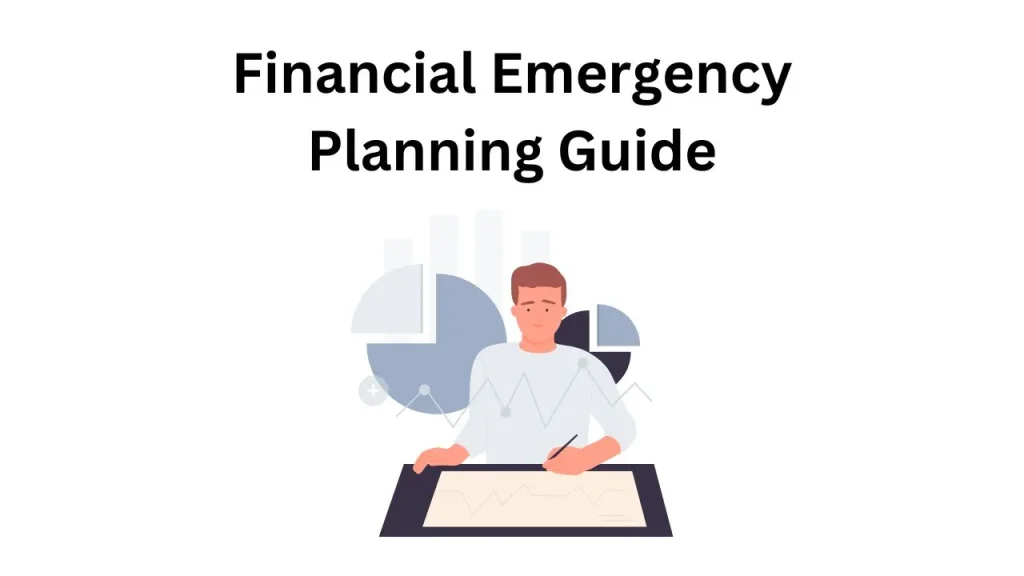I. Introduction
Financial emergencies are unpredictable but inevitable. From unexpected medical bills to sudden job loss, these emergencies can wreak havoc on your finances if you’re not prepared. In this comprehensive guide, we’ll explore the importance of preparing for financial emergencies and how you can protect yourself financially.

II. Understanding Financial Emergencies
Definition of Financial Emergencies
A financial emergency refers to an unforeseen expense that requires immediate action. These emergencies can range from medical emergencies to major car repairs or sudden job loss. They often come without warning, making it essential to have a plan in place.
Common Types of Financial Emergencies
Financial emergencies come in various forms, including medical emergencies, unexpected home repairs, car repairs, job loss, and natural disasters. By understanding the different types of emergencies, you can better prepare for them and minimize their impact on your finances.
The Impact of Financial Emergencies on Personal Finances
Financial emergencies can have a devastating impact on personal finances, leading to debt, stress, and even bankruptcy. Without adequate preparation, these emergencies can derail your financial stability and take years to recover from. By planning ahead, you can mitigate the financial damage caused by emergencies.
III. Building an Emergency Fund
Importance of Having an Emergency Fund
An emergency fund acts as a financial safety net, providing you with the funds you need to cover unexpected expenses without going into debt. Having an emergency fund can give you peace of mind knowing that you’re prepared for whatever life throws your way.
How to Determine the Size of Your Emergency Fund
Your emergency fund should ideally cover three to six months’ worth of living expenses. Calculate your monthly expenses, including rent or mortgage, utilities, groceries, and other essentials, and set a savings goal based on this amount. Having a larger emergency fund can provide even greater protection during uncertain times.
Tips for Building an Emergency Fund Quickly
Start by setting small, achievable savings goals. Cut back on unnecessary expenses such as dining out, entertainment, and subscription services, and automate your savings to make it easier to build your emergency fund. Consider earning extra income through a side hustle or selling items you no longer need to boost your savings.
IV. Types of Insurance to Consider
Health Insurance
Health insurance is essential for protecting yourself and your family against unexpected medical expenses. It covers doctor’s visits, hospital stays, prescription medications, and more. Without health insurance, a medical emergency could quickly drain your savings and leave you in debt.
Homeowners/Renters Insurance
Homeowners or renters insurance protects your home and personal belongings in the event of theft, fire, or other disasters. It also provides liability coverage in case someone is injured on your property. Having insurance can provide peace of mind knowing that you’re financially protected against unforeseen events.
Auto Insurance
Auto insurance covers damages to your vehicle in case of an accident, as well as liability if you’re at fault. It also provides coverage for theft, vandalism, and other damages. Driving without insurance is not only risky but can also result in significant financial loss if you’re involved in an accident.
Disability Insurance
Disability insurance provides you with income if you’re unable to work due to a disability. It ensures that you can continue to cover your living expenses while you recover. Disability insurance is especially important if you rely on your income to support yourself or your family.
Life Insurance
Life insurance provides financial protection for your loved ones in the event of your death. It can help cover funeral expenses, outstanding debts, and provide ongoing financial support for your family. Life insurance provides peace of mind knowing that your loved ones will be taken care of financially after you’re gone.
V. Utilizing Loans Responsibly
Types of Loans Available for Emergencies
There are several types of loans available for emergencies, including personal loans, payday loans, and lines of credit. Personal loans are typically unsecured and can be used for any purpose, while payday loans are short-term loans that must be repaid with your next paycheck.
Pros and Cons of Each Type of Loan
Personal loans offer lower interest rates and longer repayment terms, but they may require good credit. Payday loans are easy to qualify for but come with high-interest rates and fees. Lines of credit offer flexibility but may come with variable interest rates.
How to Choose the Right Loan for Your Situation
Consider your financial situation, credit score, and the urgency of your needs when choosing a loan. Personal loans are ideal for larger expenses, while payday loans are best for emergencies that require immediate cash. Compare interest rates, fees, and repayment terms to find the best option for you.
VI. Creating a Budget
Importance of Budgeting for Financial Stability
A budget helps you track your income and expenses, allowing you to identify areas where you can cut back and save money. It provides a roadmap for your finances and helps you stay on track toward your financial goals.
How to Create a Budget That Accounts for Emergencies
Include a category for emergencies in your budget and set aside a portion of your income each month for your emergency fund. Be sure to account for all of your expenses, including fixed expenses like rent or mortgage payments, utilities, and groceries, as well as variable expenses like entertainment and dining out.
Tips for Sticking to Your Budget
Track your spending regularly, avoid unnecessary expenses, and adjust your budget as needed to stay on track. Look for ways to cut back on non-essential expenses and find creative ways to save money. Consider using cash instead of credit cards to help you stick to your budget.
VII. Tips for Cutting Expenses
Strategies for Reducing Everyday Expenses
Cut back on non-essential expenses like dining out, entertainment, and subscription services. Look for ways to save money on everyday expenses, such as shopping sales, using coupons, and buying generic brands instead of name brands.
Ways to Prioritize Spending During a Financial Emergency
Focus on covering essential expenses like housing, food, and utilities first. Look for ways to reduce or eliminate non-essential expenses until your financial situation improves. Consider temporarily cutting back on discretionary expenses like dining out and entertainment until you’re back on solid financial footing.
How to Renegotiate Bills and Expenses
Contact your creditors and service providers to negotiate lower payments or payment plans. Many companies are willing to work with you during difficult times and may offer temporary relief or hardship programs. Be proactive about reaching out to your creditors and explaining your situation.
VIII. Seeking Financial Assistance
Government Assistance Programs
Explore government assistance programs like unemployment benefits, food assistance, and housing assistance. These programs are designed to help individuals and families in need and can provide temporary relief during difficult times.
Non-profit Organizations and Charities
Many non-profit organizations and charities offer financial assistance, food, and other resources to individuals in need. These organizations can provide valuable support during financial emergencies and help you get back on your feet.
How to Negotiate with Creditors
Contact your creditors to discuss your situation and negotiate lower payments or interest rates. Be honest about your financial situation and explain your difficulties. Many creditors are willing to work with you to develop a repayment plan that fits your budget.
IX. Long-Term Financial Planning
Importance of Long-Term Financial Planning
Long-term financial planning is essential for preventing future emergencies and ensuring financial stability. By setting long-term financial goals and creating a plan to achieve them, you can build a solid financial foundation and protect yourself against unexpected expenses.
Strategies for Long-Term Financial Stability
Invest in retirement accounts, save for major expenses like a home or education, and build an emergency fund to protect yourself against unexpected expenses. Consider diversifying your investments to reduce risk and maximize returns. Work with a financial advisor to develop a long-term financial plan that meets your needs and goals.
Building Wealth and Retirement Planning
Start saving for retirement as early as possible and take advantage of employer-sponsored retirement plans like 401(k)s or IRAs. Contribute regularly to your retirement accounts and take advantage of any employer matching contributions. Consider working with a financial advisor to develop a retirement savings strategy that aligns with your goals and risk tolerance.
X. Conclusion
In conclusion, preparing for financial emergencies is essential for protecting yourself and your family against unexpected expenses. By building an emergency fund, investing in insurance, and creating a budget, you can safeguard your finances and achieve long-term financial stability. Take the time to assess your financial situation and create a plan that meets your needs and goals. With the right preparation and planning, you can weather any financial storm and secure your financial future.
FAQs
- Why is an emergency fund important?
- An emergency fund provides a financial safety net, allowing you to cover unexpected expenses without going into debt. It gives you peace of mind knowing that you’re prepared for whatever life throws your way.
- How much should I save in my emergency fund?
- Aim to save three to six months’ worth of living expenses in your emergency fund. This will provide you with a financial cushion in case of job loss, illness, or other unexpected emergencies.
- What types of insurance do I need?
- The types of insurance you need depend on your personal situation, but health, auto, and homeowners/renters insurance are essential for most people. These policies can protect you financially in case of illness, accidents, or property damage.
- What should I do if I can’t afford insurance?
- If you can’t afford insurance, look for low-cost or subsidized options through government programs or employer-sponsored plans. You may also be eligible for financial assistance or discounts based on your income and circumstances.
- How can I build wealth and achieve long-term financial stability?
- Building wealth and achieving long-term financial stability requires careful planning and disciplined saving. Start by creating a budget, building an emergency fund, and investing in retirement accounts. Consider working with a financial advisor to develop a long-term financial plan that meets your needs and goals.


